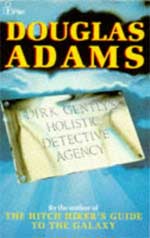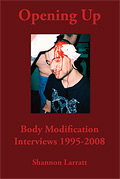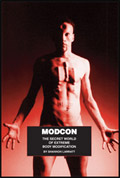.
|
I feel it is worth mentioning the “Global Consciousness Project“, a terrible piece of pseudo-science that's fooling an increasing number of legitimate news agencies into reporting it as “the machine that can see into the future” and other such malarky. If this is really hooked into the global mind, I'm pretty sure we all just got collectively stupider, and Princeton U should be ashamed… And I say that as a guy that's got his belief in the global mind tattooed on his forehead! Yeah, I feel a disturbance in the [one dimensional, low resolution binary] force.
They think that their random number generators produced anomylous results during Princess Diana's funeral and propose that the “emotional energy” of a billion people watching it altered some quantum field… You know what? It's a lot more likely that turning a billion televisions on did it than some kind of collective angst. |
One of the nice things about the time when I was locked up in the Clarke Institute mental ward, being tested for, among other things, being a hermaphrodite — the dumbass doctors there thought nipple piercing indicated some kind of genetic trans*ism — was that they allowed me to bring in my computer. It was an immense iron-clad Acer 386 beast that I'd inherited from my father.
One of my interests at the time was computer generated music (as in where the computer actually writes the music). I was reminded of it recently by this music based on the genome of the fruitfly, as well as this atrocious music based on “global consciousness as channeled by random number generators” (both found via boing boing). Both attempt to take numeric input and represent it as music, and to be blunt, sound like a mix of random notes and a speech by R2-D2. Maybe I'm a simpleton, but it's not music in anything but the academic sense of the word and certainly does not convince me that there's some underlying pattern that has been brought to light by converting it to a stream of notes.
I wrote my own music software while locked up in the Clarke for three main reasons. First, it was a good way to pass the time. As much fun as it is to sit around with nutty friends and listen to their stories about how alien commandos smashed through their wall and kidnapped them, or how they were brought by angels to this hospital from their last one, it gets boring after a while. Second, I despise “secret knowledge”, especially under an academic veil, and I wanted to show that computer generated music could sound like something other than random numbers. I hate it when people are needlessly elite.

It worked just like I imagined MacDuff's software would have to — by taking streams of numbers, quantizing them so they made harmonic sense, overlaying and synchronizing them as needed, and then outputting a MIDI file. Below are three files that were created by the software, written in late 1993.
- “First” – This was literally the first song the program ever generated. This was before I'd even written a MIDI output routine, so it spit out sheet music which I then manually entered into Cubase and saved. This was later remixed for the IAM music CD
- “The Happy Elves” – Another early piece, named as such because I imagined this might be the sort of music that happy elves would play. I wrote terrible lyrics for this even, which I hoped to have sung by a speech synthesizer, but never managed to make that work.
- “Sad Piano” – Sorry the names are so uncreative. Another early piece.
They songs are really nauseating, but they're intended as a mathematical proof of concept, not as art or music. In simple terms the goal was to show that computers could take random numbers and output them as something that would pass a Musical Turing Test — compositions that people would more likely believe was composed by a talentless human than a “talented computer”.
I must emphasize emphasize that none of those are intended to show off my (admittedly limited) ability as a musician, since they are 100% computer composed pieces based on sequences of random numbers. No remixing or alteration of the music has taken place. Personally I think they sound a million times more “real” than the output generated by the two projects I mentioned earlier, and I hope show that it's easy to trick your mind into thinking there is actual “thought” hidden away in random sequencies. I emphasize: these are just random numbers that have been quantized*.




Post a Comment